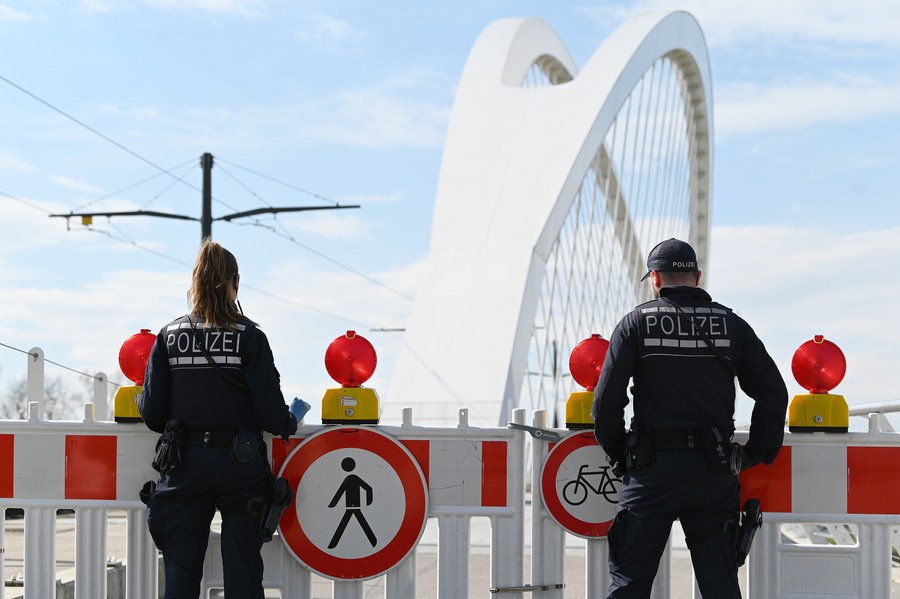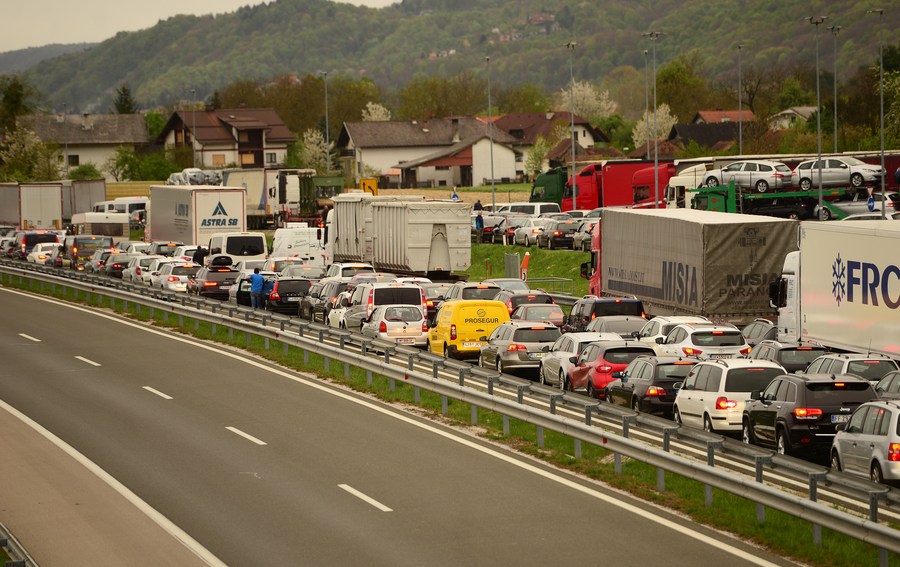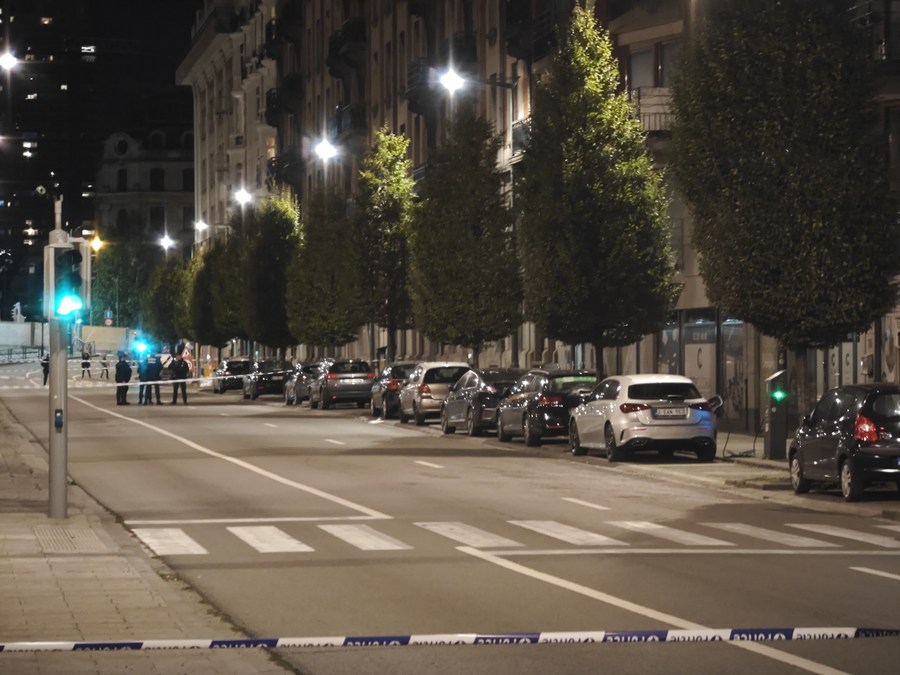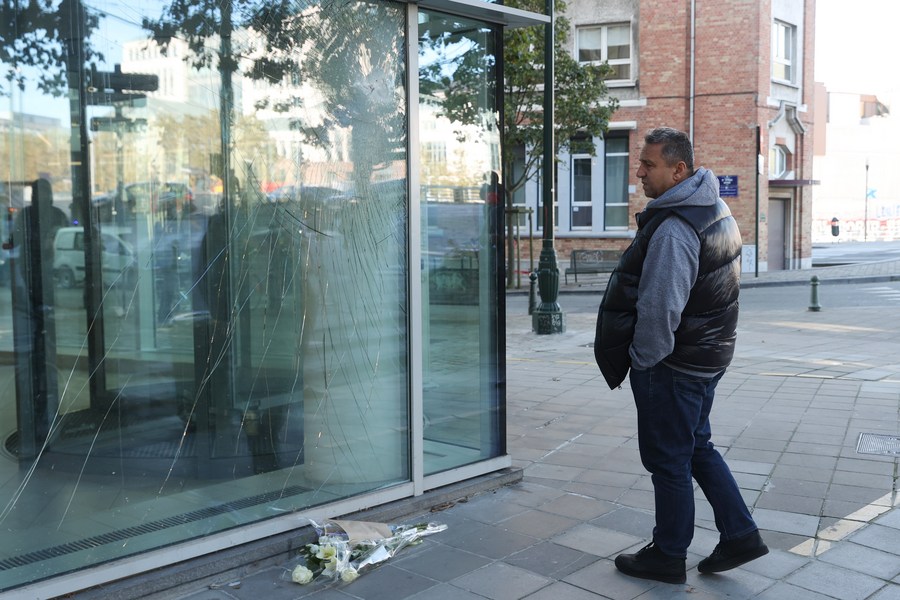
Police officers stand guard at the border between Germany and France in Kehl, Germany, March 17, 2020. (Photo by Ulrich Hufnagel/Xinhua)
The introduction of these border restrictions came at a time that multiple European countries have seen a surge in public security incidents.
BRUSSELS, Oct. 19 (Xinhua) -- Amid concerns related to extremist violence and illegal migration, several European Union (EU) countries, part of the Schengen area that typically allows free movement, have recently heightened their border controls.
On Thursday, Croatian Prime Minister Andrej Plenkovic announced temporary reintroduction of border controls with Slovenia, hours after the Slovenian government decided to implement border controls with Croatia and Hungary from Saturday till Oct. 30.
"There is a need for immediate action to ensure public order and security of our citizens as well as the citizens of the European Union," the Slovenian government said in a statement.
On Wednesday, Italy temporarily suspended the EU's Schengen rules for open travel, reactivating dormant border controls with Slovenia.

Vehicle wait in queues in Obrezje, one of the main border crossings connecting capitals of Slovenia and Croatia, in Slovenia, on April 7, 2017. Travellers witnessed extended queues at the border controls between Slovenia and Croatia on Friday, the first day that stricter border checks on the outer border of the Schengen area is introduced. (Xinhu/Matic Stojs)
On the border between Italy and Slovenia, controls will begin on Oct. 21 and last for at least ten days, said the Italian government, adding that the goal is a "rapid return" to control-free border crossings, but the measure could be extended.
"The suspension of the Schengen Treaty on free movement in Europe was necessary due to the worsening situation in the Middle East, the increase in migratory flows along the Balkan route, and above all for reasons of national security," Italian Prime Minister Giorgia Meloni said on social media.
Germany on Monday also notified the European Commission of temporary controls at its borders with Poland, the Czech Republic and Switzerland in an effort to fight illegal migration.
The decision came as "the business of traffickers is becoming increasingly brutal and unscrupulous," said German Interior Minister Nancy Faeser. By the beginning of October, Germany had already detected 98,000 unauthorized entries, 6,000 more than in the whole of last year.

Police cordon off the site of a shooting in Brussels, Belgium, on Oct. 16, 2023. Two Swedish soccer fans were killed in a shooting that rocked Brussels on Monday evening, while the Belgian Red Devils team were playing against Sweden at the King Baudouin Stadium 4.8 kms away from the site. (Xinhua/Liu Yuxuan)
The introduction of these border restrictions came at a time that multiple European countries have recently seen a surge in public security incidents.
After a 45-year-old gunman of Tunisian origin shot dead two Swedish citizens in the center of Brussels on Monday evening, Belgian authorities have raised the terror threat level for the whole country.
On Tuesday, Italy arrested two people suspected of recruiting for the Islamic State. Italian Foreign Minister Antonio Tajani downplayed the immediate threat of a terror attack in Italy, but said it was important for the country to remain vigilant.
Moreover, a number of European airports received bomb threats in last few days. According to French police, at least seven airports received threats and were evacuated on Thursday, including those in Lille, Lyon, Bordeaux, Nantes and Toulouse.

A man checks the bullet hole of Monday evening's shooting in Brussels, Belgium, Oct. 17, 2023. Belgium's Federal Prosecutor's Office confirmed on Tuesday that the suspect in Monday evening's shooting in Brussels that resulted in two deaths and one injury has been identified and is deceased. (Xinhua/Zhao Dingzhe)
A bomb threat also triggered the evacuation of Ostend-Bruges Airport in northwestern Belgium on Wednesday.
The ongoing war in Gaza has strained the nerves of many European countries, especially France and Germany, which are home to the European Union's largest Jewish and Muslim communities.
As the Palestine-Israel conflict entered into the second week, there is still no end in sight. It's uncertain how long the Schengen countries will maintain such border controls or whether more countries will follow suit.
At a press conference on Thursday, Croatian Prime Minister Plenkovic said: "Schengen is not finished, but it has a problem. The introduction of border controls is not a novelty, it comes about due to migration trends and assessments of increased security threats due to terrorism." ■
